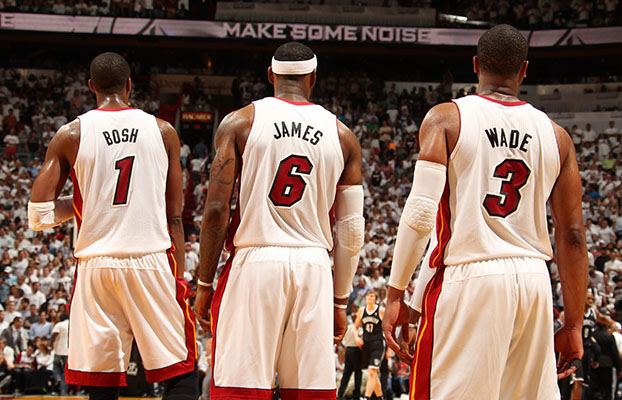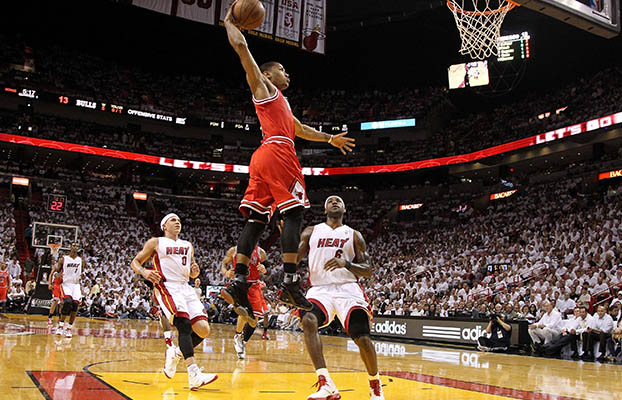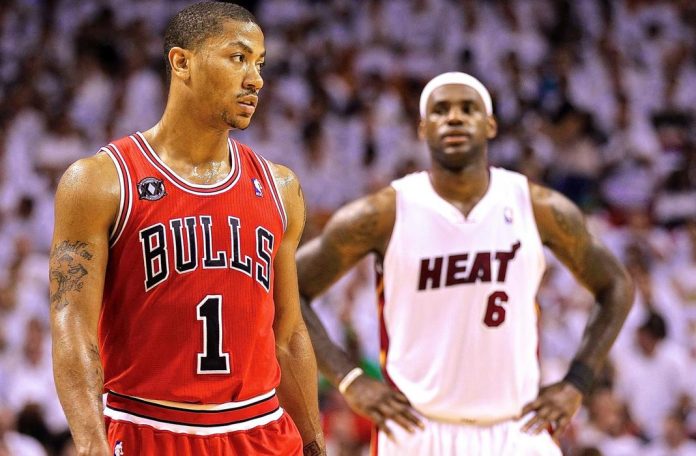Nobody in NBA history has won four straight MVPs. So, when we breach the subject of somebody potentially winning five in a row, not only are we entering unheard of territory, we’re discussing a stretch of dominance nobody has come close to reaching.
Yet, if some people are to believed, LeBron James should’ve accomplished this feat from 2008-2013. James won back-to-back MVPs from 2008-2010, and then went back-to-back one more from 2011-2013. The 2010-11 season, James’ inaugural season in a Miami Heat jersey, is the gap in his string of MVPs.
From a statistical perspective, it’s easy to see why James had a case. Derrick Rose was the official winner of the 2011 MVP, the youngest recipient of the award at age 22. James averaged 27-8-7 compared to Rose’s 25-4-8 while slashing 51/33 from the field compared to Rose’s 45/33. His Heat won 58 games, and Rose’s Bulls finished 62-20, first and second in the East.
Depending on who you asked, he was either the best or second-best player (behind Kobe) in the world at that point too. The Heat were heavy favorites to win the title in their debut season, as “The Heatles” set to dominate the league. In hindsight, and based purely on the numbers, James should’ve been the easy favorite.
Just going off the numbers is a grave mistake in any MVP consideration, however. As the years pass, time fogs much of the context surrounding the season. There’s a reason why James garnered just four first-place votes out of a possible 120 that year, finishing not just second but third in the MVP race. And, no, it’s not just because the media hated him for the infamous “Decision”.

First, Rose’s supporting cast on the Bulls was strikingly inferior to James’. For context, this was the year that James linked up with Chris Bosh and Dwyane Wade in Miami. Rose’s Bulls had just finished 41-41 the previous season, and he was in just his third year in the league. The Heat had a weak bench because they had to gut the roster to afford Bosh and James, but James still had Dwyane Wade and Chris Bosh. Those two have 24 All-Star appearances between them and are both future first-ballot Hall of Famers. Bosh was a top-10 player who averaged 24.8 PPG and 10.8 REB the prior season, and Wade was already a Finals MVP and a consensus top-5 player.
Meanwhile, Rose’s second-best player was Luol Deng, who averaged 17.5 PPG and 5.8 REB. Joakim Noah and Carlos Boozer played just 48 and 59 games respectively, forcing Kyle Korver and Taj Gibson to be the third and fourth options on most nights. 38-year-old Kurt Thomas started at center and averaged just 4.8 PPG and 5.3 REB. Does that sound like a 62-win team? Not only did Rose have a worse supporting cast, he even won more games than James.
The degree of difficulty for Rose that year was also markedly higher. Rose had to do everything for that Bulls team as both their best scorer and playmaker. Deng was good, but he was more of a glorified role player than a star. Night in and night out, Rose relentlessly attacked the hoop with an aggressiveness reserved for bigger, stronger players. He was the little engine that could, except this engine jumped 42 inches and had an all-time great layup package.

The only way to stop Rose, once he took flight, was to foul him, and to foul him hard. How many times was he slammed down to the floor after trying to dunk on someone or had his legs cut out from under him as he pulled off yet another acrobatic layup? It was the same treatment Michael Jordan once received, as well as Kobe Bryant, and then LeBron James himself. Except Rose was a 6’3″ point guard who never had the size or strength of Jordan or LeBron. Every time he crashed onto the floor, his punishment was magnified. There were no nights off for Rose. Every game was a battle for the guard who had springs in his legs and knees made of glass.
Meanwhile, James had two superstars to lean on. Wade averaged 25.5 PPG and 4.6 AST that year while playing 76 games. Bosh averaged 18.7 PPG in 77 games. James made that team nearly unbeatable, but Miami would still be elite without him. Take Rose away from the Bulls, however, and Chicago finishes dead last in the entire NBA. With him, the Bulls go 62-20 and own the best record in the league. And, this is a league that included Dwight Howard’s Magic, The Big Four Celtics, Dirk Nowitzki’s Mavericks, Kobe’s Lakers, Duncan and Popovich’s Spurs, and James’ Heat themselves. Rose’s Bulls finished with a better record than all of them. Is that not the definition of Most Valuable?
James’ own teammate Chris Bosh gave his support to Rose. On February 24, through ESPN, Bosh said, “I think I would give it to Derrick if I was a voter. He’s playing well like he’s the best point guard in the league and best player in the league. He’s the most valuable player if you really think about it”. So much for having supportive teammates…
But, guess what? Even James, himself, a man known for his passive-aggressive criticism of the media, voiced his support for Rose. In an interview with ESPN when asked about the MVP award on March 30, James said “I think [it’s] Derrick Rose. What he’s done for that team, with all the injuries they have and them being first in the Eastern Conference—they’re playing some really good basketball.”
LeBron James’ case for the 2011 MVP boils down to having a slightly better stat line. Forget about half-baked arguments, this one never even found its way into the oven. There’s a reason why Rose received 113 out of the possible 120 first-place votes. James wasn’t even the runner-up, finishing behind Dwight Howard. Rose is the indisputable winner of the 2011 NBA MVP, and anything else is revisionist history.
Instagram: @j_persources
Twitter: @j_persources

